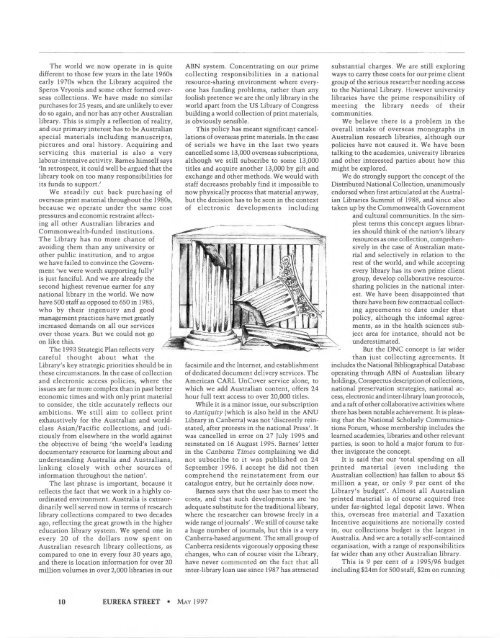n - Eureka Street
n - Eureka Street
n - Eureka Street
You also want an ePaper? Increase the reach of your titles
YUMPU automatically turns print PDFs into web optimized ePapers that Google loves.
The world we now operate in is quitedifferent to those few years in the late 1960searly 1970s when the Library acquired theSperos Vryonis and some other form ed overseascollections. We have made no similarpurchases for 25 years, and are unlikely to everdo so again, and nor has any other Australianlibrary. This is simply a reflection of reality,and our primary interest has to be Australianspecial materials including manuscripts,pictures and oral history. Acquiring andservicing this m aterial is also a verylabour-intensive activity. Barnes himself says'In retrospect, it could well be argued that thelibrary took on too many responsibilities forits funds to support.'We steadil y cu t back purchasing ofoverseas print material throughout the 1980s,beca use we operate under the same costpressures and economic restraint affectingall other Australian libraries andCommon wealth-funded institutions.The Library has no m ore chance ofavoiding them than any university orother public institution, and to arguewe have failed to convince the Government'we were worth supporting fully'is just fanciful. And we are alrea dy thesecond highest revenue earner for anynational library in the world. We nowhave 500 staff as opposed to 650 in 1985,who by their ingen uity and goodm anagement practices have met grea tlyincreased demands on all our servicesover those years. But we could not goon like this.T he 1993 Strategic Plan reflects verycareful thought about what theLibrary's key strategic priorities should be inthese circumstances. In the case of collectionand electronic access policies, where theissues are far more complex than in past bettereconomi c times and with only print materialto consider, the title accurately refl ects oura mbitions. We still aim to collect printexhaustively for the Australian and worldclassAsian/ Pacific collections, and judiciouslyfrom elsewhere in the world againstthe objective of being 'the world's leadingdocumentary resource for learning about andunderstanding Australia and Australians,linking closely with other sources ofinformation throughout the nation'.The last phrase is important, beca use itreflects the fact that we work in a highly coordinatedenvironment. Australia is extraordinarilywell served now in terms of researchlibrary collections compared to two decadesago, reflecting the great growth in the highereduca tion library system . We spend one inevery 20 of the dollars now spent onAustralian research library collections, ascompared to one in every four 30 years ago,and there is loca tion information for over 20million volumes in over 2,000 libraries in ourABN system. Concentrating on our primecollecting responsibilities in a nationalresource-sharing environment where everyonehas funding problems, rather than anyfoolish pretence we are the only library in theworld apart from the US Library of Congressbuilding a world collection of print materials,is obvious] y sensible.This policy has meant significant cancellationsof overseas print materials. In the caseof seria ls we have in the last two yearscancelled some 13,000 overseas subscriptions,although we still subscribe to som e 13,000titles and acquire another 13,000 by gift andexchange and other methods. We would withstaff decreases probably find it impossible tonow ph y ically process that material anyway,but the decision has to be seen in the contextof electronic developments includingfacsimile and the Internet, and establishmentof dedicated document delivery services. TheAmerican CARL UnCover service alone, towhich we add Australian content, offers 24hour full text access to over 20,000 titles.While it is a minor issue, our subscriptionto Antiquity (w hich is also held in the ANULibrary in Canberra) was not 'discreetly reinstated,aft er protests in the national Press'. Itwas cancelled in error on 27 july 1995 andreinstated on 16 August 1995 . Barnes' letterin the Canberra Times complaining we didnot ubscribe to it was published on 24September 1996. I accept he did not thencompreh end the reinstatement from ourcatalogue entry, but he certainly does now.Barnes says that the user has to meet thecosts, and that such developments are ' noadequate substitute for the traditional library,where the researcher can browse freely in awide range of journals'. We still of course takea huge number of journals, but this is a veryCanberra-based argument. The small group ofCanberra residents vigorously opposing thesechanges, who can of course visit the Library,have never commented on the fact that allinter-library loan use since 1987 has attractedsubstantial charges. We are still exploringways to carry these costs for our prime clientgroup of the serious researcher needing accessto the National Library. However universitylibraries have the prime responsibility ofm eeting the libra ry needs of thei rcommunities.We believe there is a problem in theoverall in take of overseas monographs inAustralian research libraries, although ourpolicies have not caused it. We have beentalking to the academies, university librariesand other interested parties about how thismight be explored.We do strongly support the concept of theDistributed N ational Coll ection, unanimouslyendorsed when first articulated at the Au tralianLibraries Summit of 1988, and since alsotaken up by the Commonwealth Governmentand cultural communities. In the simplest terms this concept argues librariesshould think of the nation's libraryresources as one co llection, comprehensivelyin the case of Australian materialand selectively in relation to therest of the world, and while acceptingevery library has its own prime clientgroup, develop coll aborative resourcesharingpolicies in the national interest.We have been disappointed thatthere have been few contractual collectingagreements to date under thatpolicy, although the informal agreements,as in the health sciences subjectarea for instance, should not beunderestimated.But the DNC concept is far widerthan just co llecting agreements. Itincludes the National Bibliographica l Databaseoperating through ABN of Australian libraryholdings, Conspectus description of coll ections,national preservation strategies, national access,electronic and inter-library loan protocols,and a raft of other collaborative activities wherethere has been notable achievement. It is pleasingthat the N ational Scholarly CommunicationsFomm, whose m embership includes thelearned academies, libraries and other relevantparties, is soon to hold a major forum to furtherinvigorate the concept.It is said that our 'total spending on allprinted material (even including theAustralian collection) has fallen to about $5million a year, or only 9 per cent of theLibrary's budget'. Almost all Australianprinted m aterial is of course acquired freeunder far-sighted legal deposit laws. Wh enthis, overseas free material and TaxationIncentive acquisitions are notionally castedin, our collections budget is the largest inAustralia. And we are a totally self-containedorganisation, with a range of responsibilitiesfar wider than any other Australian library.This is 9 per cent of a 1995/96 budgetincluding $24m for 500 staff, $2m on running10 EUREKA STREET • MAY 1997
















